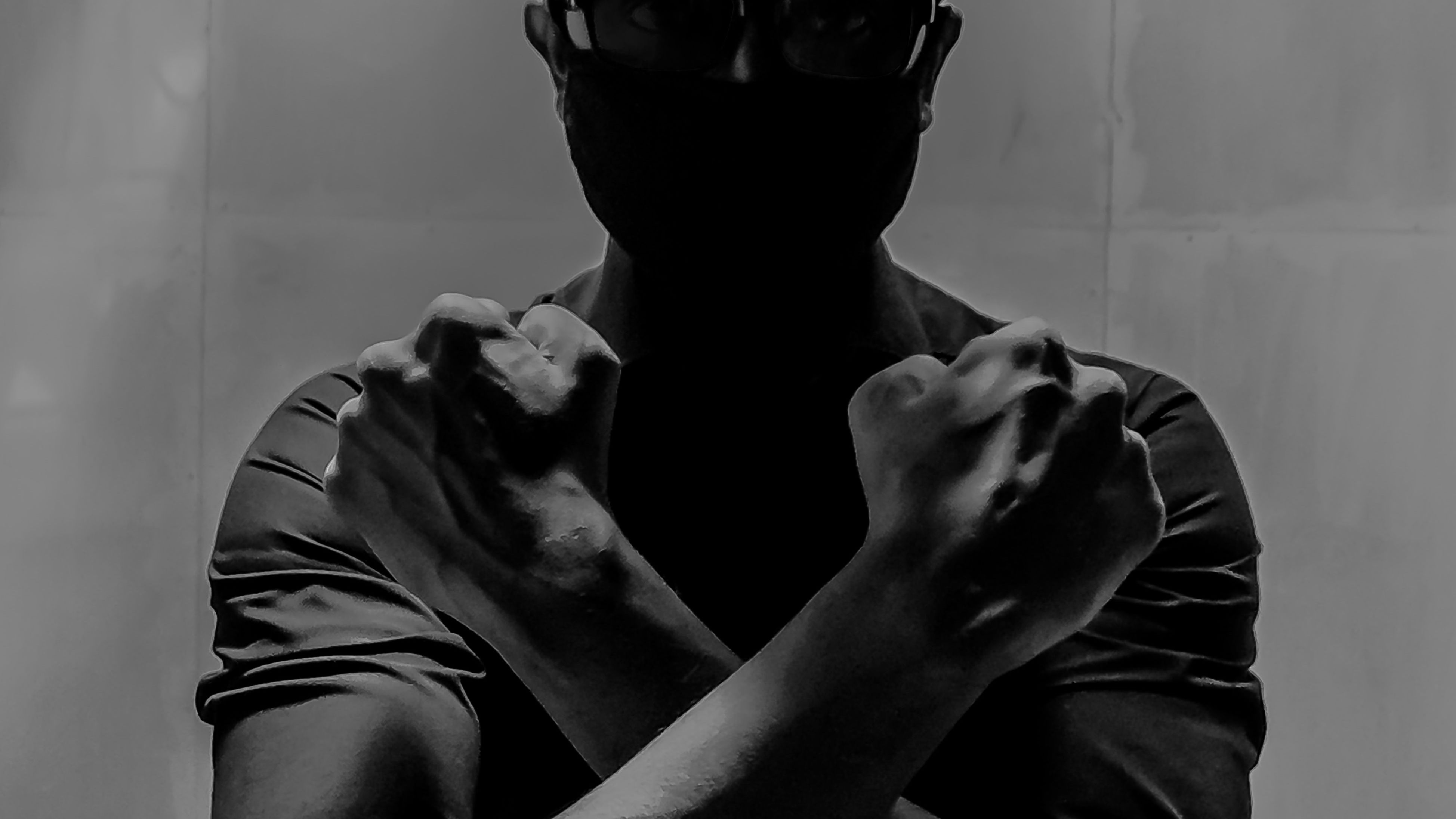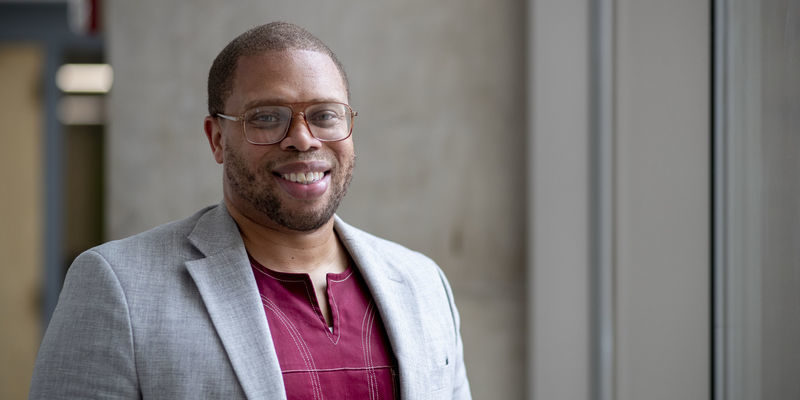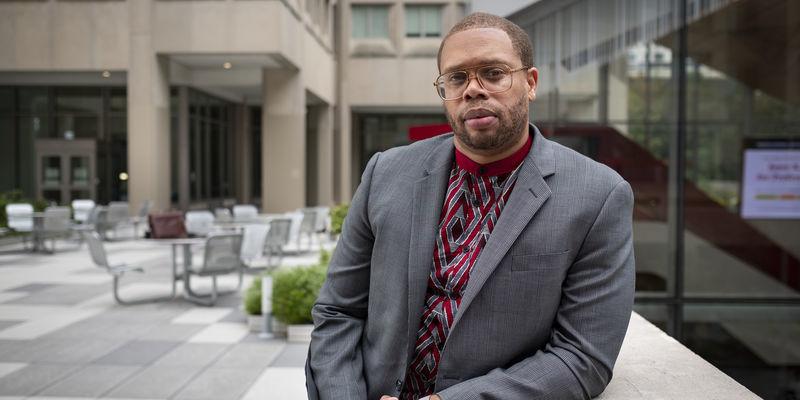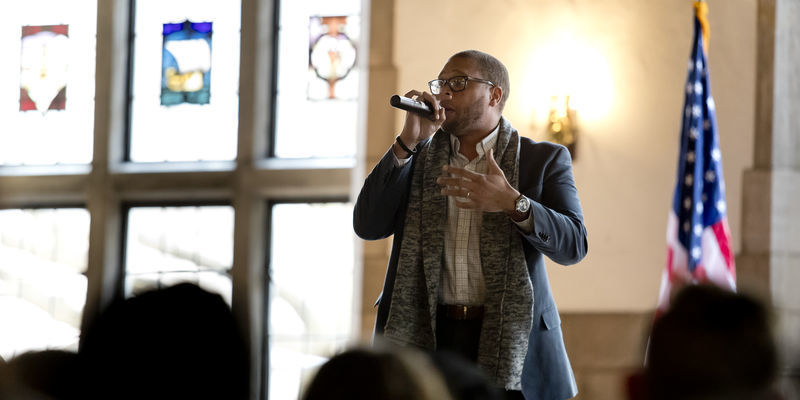Breaking down the hidden messages in ‘Black Panther: Wakanda Forever’
Timothy Welbeck, associate professor of Africology and African American studies and the director for Temple University’s Center for Anti-Racism, breaks down the symbolism, themes and deeper meanings that can be found in the Black Panther sequel. He also shares what we can expect to see in the third Black Panther movie.

When Timothy Welbeck is not teaching Africology and African American studies at Temple University, leading the development of the university’s new Center for Anti-Racism, meeting with students, or grading papers, he finds refuge from his busy academic life within the colorful pages of comic books.
Welbeck is quick to acknowledge that people still, just as they did when he was a child, dismiss comic books as a lowbrow leisure activity. But as an assistant professor who is constantly encouraging his students to look at things more deeply, he feels many are missing out on the magic that lies just beneath the surface of those neat rows of comic panels. To Welbeck, comic books are a mirrored version of our world where there is freedom to explore and analyze the issues that plague us in the real world.
So when Marvel Studios released the first Black Panther movie in 2018, he was understandably elated by the meticulous depictions of the film, writing for WHYY that “the magnificence of Black Panther is in its reimagining of Africa.” Comic books may still be an underappreciated genre of literature, but Welbeck knew transforming them into films would allow society to start doing the same kind of processing of our real-world issues, particularly regarding race.
With the release of the Black Panther sequel Wakanda Forever, Welbeck sees clear reflections of our world’s experience of grief, resilience, political division and long-lasting impact of colonialism. In this article, he breaks down the symbolism, themes and deeper meanings that can be found in Wakanda Forever, and what we can expect to see in the next Black Panther stories from Marvel.
This article contains spoilers for Black Panther: Wakanda Forever.
On what the country of Wakanda represents
“This representation of Wakanda defies the past representation of Africa that happened throughout modern pop culture. If you consider stories like Tarzan, Zulu, Jungle Jitters from Looney Toons, they depicted Africa in very primitive and debased ways as if it was a land teeming with savages who were eating each other and living in the Dark Ages.
Wakanda represents Africa in its fullest glory. In some ways it’s the Afrofuturist imagination of what Africa could be. Wakanda is this technologically advanced society, a kingdom that has never been conquered. It’s a society that’s free of disease, free of poverty, free of the ‘isms’ that plague other civilizations across the globe. For example, we don’t see patriarchy or sexism or racism in Wakanda. What we do see is this broader sense of humanity acknowledged and affirmed, and we see that in a variety of ways. One that stands out to me is that the women are fully actualized people. They’re not props to advance storylines or secondary ancillary characters.
In a historical sense, both Black Panther films allude to real cultures and traditions from Kemet, Ethiopia, Mali, Ghana and Songhai. But the films take these cultural influences and then also imagine what these civilizations could look like in the future. That kind of representation is vital in order to shift the narrative of what Africa is and can be.”
On the meaning of the ‘Wakanda Forever’ phrase and hand gesture
“Wakanda Forever is more than a phrase, it’s a promise that a civilization can go forward in the face of unspeakable hardship and inescapable grief. That they could lose a beloved leader like T’Challa and still persevere forward and fulfill the promise that their civilization will be here tomorrow and the day after that. In that way it’s Wakanda forever.
Various historians have looked to see if there’s significance in the Wakandan hand gesture [where they cross their wrists over their chests] but I haven’t seen a consensus. Some scholars of the Ancient African civilization of Kemet have noticed that there are various references to similar gestures in their hieroglyphics. So, while I’m not fully certain whether Marvel meant to reference the Kemet, at the very least the gesture is something that is meant to unite people together in a universal symbol.”
On the film’s theme of grief
The film is profound in the way that it communicates the experience of grief. It conveys that, in dealing with grief, there comes a point where you must confront it. And if you just push it away, it has the power to grow and consume you in the process.
That was the threat that grief posed to Shuri. It morphed from grief into rage and that rage could be a conflagration that would consume her. Early in the film, we see that Shuri is having an existential crisis of sorts. Her world is crashing down around her. She's dealing with the death of her brother who was her first friend and her first protector. When the moment came that she had an opportunity to protect him, she was unable to do so, and she's devastated by that. To cope, she buries herself in her work and tries to hide from acknowledging the finality of his death. Then in the middle of the film, she loses her mother on top of that and spirals from there. She's consumed by this grief that morphs into rage.
A critical point in the film is when she finally assumes the mantle of Black Panther and goes to the ancestral plane. We’re expecting that she'll see Queen Ramonda or T’Chala. But she sees Killmonger, N'Jadaka, and he forces her to look her reality in the face. Will she be like her estranged cousin? Or will she be like her brother? She has to determine if she will extinguish her growing rage or allow it to engulf her and burn the world down around her.
Shuri’s grief-turned-rage symbolizes how our personal grievances can cause us to champion issues that can be detrimental to other people. We see that in our own world by the splintering of political factions. In this division, there is a sense that ‘I want to impose my will and my view of society on other people. And I feel like I can do that because I'm aggrieved for some reason.’ So watching Shuri's evolution as she deals with her emotions as part of her character arc, can be instructive to us too. It shows us the perilous route that we can take if we allow rage to consume us, and as a result become vengeful and angry and want to tear everything down. It takes Shuri the entire film to get there, but she does find peace in the end. That's the underlying message in Wakanda Forever, that grief is a natural part of life, that rage can engulf us and force us into regrettable decisions and that there is a better, more peaceful future when we step aside from rage.
On the film’s theme of colonialism
“One of the persistent undercurrents of Wakanda Forever is the theme of colonialism. In the very beginning of the film, you see global powers calling on Wakanda, trying to hold them to their promise of sharing their vibranium resources with the world. Queen Ramonda responds that while Wakanda understands that a commitment was made, they are fearful of what would happen if their resources fell into the wrong hands. So, threats are aimed at Wakanda, and foreign entities try to steal the vibranium to create weapons of mass destruction. In many ways that mirrors the imperial and colonial efforts to mine Africa of its resources, disregard the wishes of the people, and cut up the continent.
And similarly, Namor and his people created a kingdom, Talokan, in the ocean to escape the threat of colonialism. When they came back to the surface, they realized that their land was now dominated by the Spaniards who were enslaving Namor’s people. Thus the Talokanil escaped colonialism by hiding from the rest of the world in their underwater kingdom. But when the world discovers vibranium in the ocean, it becomes a threat to this entire underwater civilization that has existed for centuries.
And the Wakandans and the Talokanil go to war with each other too, and they get to the point where they are on the brink of mutually assured destruction. But at that point their leaders decide that they are stronger together than they are apart. Of course, the messaging here is that regardless of how people may manifest their cultures and societies, they ultimately want the same thing: agency, autonomy, the ability to love and the ability to rear their children.”
On the significance of the Ironheart character
“One of the most powerful characters in the film is Riri Williams and her Ironheart persona. In Riri’s character we see the real-world plight of a young Black woman in America. She grew up in Chicago, her father and friend were victims of gun violence, and Riri herself almost becomes a victim of gun violence. And when the world eventually recognizes her genius, they throw her into the Massachusetts Institute of Technology so they can mine her mind for its power. But she perseveres and finds a second home in Wakanda where the people there recognize her genius, but also value her as a person and are willing to fight for her. That's a beautiful message, particularly for what Ironheart represents in the film. She’s a Black American woman in Africa for the first time, and she finds a place that she can call home and people who are willing to fight for her.”
On the film’s mirroring of the modern Black women’s experience in America
“From the first scene, this sequel deals with Chadwick Bozeman’s death. You actually witness the death of the beloved leader of Wakanda as the film is opening, and then from there you see the nation rallying around the royal family and their collective response to the grief. Queen Mother Ramonda must resume her title as a leader, Shuri is now next in line to the throne, Nakia is off somewhere looking for answers to her grief and the Dora Milaje have strengthened their resolve to protect their kingdom in the face of this loss.
I’m not certain how much this is intentional but one of the great parallels of our world and the Wakanda Forever world is how it mirrors the ways in which Black families oftentimes have to grapple with the loss of their patriarch. In the instance of Black Panther, T’Challa’s father dies tragically and then T’Challa also suffers a tragic death. Ramonda, now the matriarch, was forced to face two unexpected untimely deaths of the men in her family. She must resume the leadership of the nation and her daughter, Shuri, must also step up to fill the void, as do the other women within their periphery. That mirrors so much of what we’ve seen in this country of Black mothers across the country who’ve lost a son, who’ve lost a husband, who’ve lost a partner, reeling from that and having to piece together the fragments of their family. Some of them have turned that into activism. In Wakanda Forever, you see these women having to deal with their own personal grief, but still lead a nation and have answers for people who have so many questions.
One of the things that Ramonda laments is that she lives in the most powerful nation in the world and could not protect her children. I imagine that there are many mothers across Philadelphia and across this country who have said the same thing. ‘I live in the most powerful nation in the world and cannot protect my children from the perils that are outside of my home.’ This is a particularly unique experience to Black people across the country who disproportionately face these various perils. This includes state-sanctioned violence, gun violence more generally and overexposure to COVID-19 that accelerated the pace of death for many. There is this specter of death that circles the Black community in America in many ways. And so the film is perfect for this moment. It helps to capture the emotions in the Black community across the country and demonstrates what they can do with their grief, how they can begin to put together a life after it crumbles around them.”
On the representation of Black female power
“Wakanda Forever is replete with examples of the power of Black women and that absolutely parallels what we are see in our society today. Every meaningful struggle for progress and advancement in this country have had Black women on the front lines fighting for a better tomorrow. Whether it is abolition, whether it was suffrage, regardless of what the issue has been, you see Black women there at the front leading. And so in this way, the film is especially inspiring and empowering. It’s emblematic of real life.
So many of the superheroes of our day have been Black women. Look at Ida B. Wells Barnett, Fannie Lou Hamer, Coretta Scott, King Rosa Parks, Harriet Tubman, Sojourner Truth. So many of the people who fought to make this world better, who risked their lives, who have been at the forefront of these movements have been Black women. I hope that they see themselves in these Black Panther characters when they go to watch the film. Black American women may not wear vibranium suits, they may not fly through the sky, but hopefully Black women can see themselves as the heroes they are in our everyday lives.”
On Marvel’s future and the future of ‘Black Panther’ story
“So one of the beauties of Wakanda Forever is that it introduces so many characters that will allow Marvel to continue to have an increasingly diverse cast of characters. We have Wakanda, we have Talokan, we now have Ironheart and Riri Williams. There are all these different characters that can represent different factions of Marvel’s audience, and also segments of the global society. For so long films and comic books were showing one view, one representation, one type of people, and it took creative minds to begin to conceive of these different characters.
There are so many directions that Marvel can now go in terms of the future of the Black Panther series, but I’m confident that there will be another movie. If the themes from this film are continued into the third film, we’ll likely see Shuri continuing as a reluctant Black Panther. We also now know that Shuri has a nephew, the son of T’Challa and Nakia, who’s also named T’Challa. So we will likely see a T’Challa as Black Panther again, even if it’s sometime in the projected future. There will also probably be a coming- of-age story for young T’Challa as he comes to grips with his identity while living in Haiti with his mother Nakia.
I believe the third Black Panther movie will revisit these themes of rebuilding identity, embracing community and communal customs, and the power of aligning with other people.”


